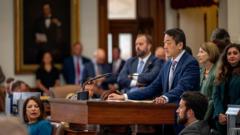As the House gears up for what could be a historic vote on President Trump’s extensive domestic policy bill, the path to a decision has been fraught with tension and division among Republicans. Speaker Mike Johnson displayed visible relief as he managed to rally party support, despite a night filled with negotiations and potential revolt from conservative holdouts within the GOP.
This landmark legislation proposes a staggering $4.5 trillion tax cut, priorities for military and border security funding, and a drastic $1 trillion reduction in Medicaid and food assistance—changes that could have profound effects on millions of Americans. The bill’s passage comes after the opposition from Democrats was marked by an impassioned but lengthy floor speech from Representative Hakeem Jeffries, who spent nearly nine hours addressing the implications of the bill and advocating for social safety programs.
Speaker Johnson framed the bill as essential for the nation’s safety and prosperity, capitalizing on the upcoming Independence Day celebrations to invoke patriotic sentiments among lawmakers. However, with the proposed funding cuts and tax reductions, dissenting voices within the GOP question the long-term effects on the national deficit and the impacts on their constituents.
Tensions flared within the House, and concerns about the bill's consequences were a prevailing theme, leading to potentially significant pushback from voters in the upcoming elections. With polling indicating that a mere 29% of voters support the bill, and many expressing doubts about its benefits, the road ahead appears steep for Republicans as they prepare to defend this legislation against anticipated Democratic campaigns.
As the moment for the final vote approaches, the political stakes are higher than ever, making this legislative decision one that could echo across Congress and shape the future of the Republican Party as it heads toward another significant midterm election.
This landmark legislation proposes a staggering $4.5 trillion tax cut, priorities for military and border security funding, and a drastic $1 trillion reduction in Medicaid and food assistance—changes that could have profound effects on millions of Americans. The bill’s passage comes after the opposition from Democrats was marked by an impassioned but lengthy floor speech from Representative Hakeem Jeffries, who spent nearly nine hours addressing the implications of the bill and advocating for social safety programs.
Speaker Johnson framed the bill as essential for the nation’s safety and prosperity, capitalizing on the upcoming Independence Day celebrations to invoke patriotic sentiments among lawmakers. However, with the proposed funding cuts and tax reductions, dissenting voices within the GOP question the long-term effects on the national deficit and the impacts on their constituents.
Tensions flared within the House, and concerns about the bill's consequences were a prevailing theme, leading to potentially significant pushback from voters in the upcoming elections. With polling indicating that a mere 29% of voters support the bill, and many expressing doubts about its benefits, the road ahead appears steep for Republicans as they prepare to defend this legislation against anticipated Democratic campaigns.
As the moment for the final vote approaches, the political stakes are higher than ever, making this legislative decision one that could echo across Congress and shape the future of the Republican Party as it heads toward another significant midterm election.




















